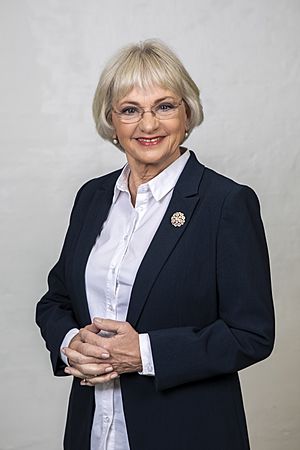Pia Kjærsgaard facts for kids
Quick facts for kids
Pia Kjærsgaard
|
|
|---|---|

Official portrait, 2023
|
|
| Speaker of the Danish Parliament | |
| In office 3 July 2015 – 21 June 2019 |
|
| Preceded by | Mogens Lykketoft |
| Succeeded by | Henrik Dam Kristensen |
| Leader of the Danish People's Party | |
| In office 6 October 1995 – 12 September 2012 |
|
| Preceded by | Party established |
| Succeeded by | Kristian Thulesen Dahl |
| Leader of the Progress Party | |
| In office 1985–1995 |
|
| Preceded by | Mogens Glistrup |
| Succeeded by | Kirsten Jacobsen |
| Member of the Folketing | |
| Assumed office 10 January 1984 |
|
| Constituency | Copenhagen (1984–1987) Funen (1987–1998) Copenhagen (1998–2007) Zealand (2007–2015) Greater Copenhagen (2015–present) |
| Personal details | |
| Born |
Pia Merete Kjærsgaard
23 February 1947 Copenhagen, Denmark |
| Political party | Danish People's Party (1995–present) |
| Other political affiliations |
Progress Party (1979–1995) |
| Spouse |
Henrik Thorup
(m. 1967) |
| Children | 2 |
Pia Merete Kjærsgaard (born 23 February 1947) is a Danish politician. She was the Speaker of the Danish Parliament (called the Folketing) from 2015 to 2019. She also used to be the leader of the Danish People's Party.
Pia Kjærsgaard helped start the Danish People's Party and led it from 1995 to 2012. Before that, she led another party called the Progress Party from 1985 until 1995. She is well-known in Denmark for her strong opinions against too much immigration and for supporting certain governments from 2001 to 2011. Her ideas have also influenced similar groups in other parts of Europe.
On 7 August 2012, Pia Kjærsgaard announced she would step down as the leader of the Danish People's Party. She chose Kristian Thulesen Dahl to take over, and he became the new leader on 12 September 2012.
Contents
Early Life and Work
Pia Kjærsgaard was born in Copenhagen, Denmark. Her father was a paint seller, and her mother was a housewife. After finishing school in 1963, she went to a business school in Copenhagen. From 1963 to 1967, she worked helping older people in their homes. Later, from 1978 to 1984, she worked as an office assistant, dealing with insurance and advertising.
Political Journey
Becoming a Member of Parliament
Pia Kjærsgaard started her political journey with the Progress Party. She ran for election in different areas of Denmark from 1979 to 1984.
In 1984, she won her first seat in the Folketing, which is the Danish parliament. She represented the Copenhagen area first, and then the Funen area.
Starting the Danish People's Party
In 1995, things were getting difficult within the Progress Party. So, Pia Kjærsgaard decided to leave and help create a new party called the Danish People's Party (DPP). She then ran for election as a candidate for the DPP.
As the Progress Party became less popular, the DPP grew. By 2001, it was the third-largest party in the Folketing. In the 2005 election, the DPP gained even more support. Pia Kjærsgaard herself received many votes, showing how popular she was.
Leading the Parliament
On 3 July 2015, after her party did very well in the June 2015 election, Pia Kjærsgaard was chosen to be the Speaker of the Folketing. This was a big moment because she was the first woman to hold this important position in the Folketing. The Speaker is like the leader of the parliament's meetings. Many different parties, both from the government and the opposition, supported her for this role.
About the Danish People's Party
The Danish People's Party mainly focuses on Danish identity and culture. They also want to make laws tougher on crime and support social programs for Danish citizens.
The DPP became very successful in the 2001 elections, becoming the third-largest party. This meant they could help support the government, which was made up of the Liberal and Conservative parties. Because of this, the DPP was able to help make many of its ideas into laws.
In both the 2005 and 2007 elections, the DPP kept its strong position. This allowed them to continue playing a big role in shaping policies for the government.
Her Main Political Ideas
Pia Kjærsgaard's most important political goals include limiting the number of people coming to Denmark from other countries. She also believes that society should take better care of older people. Another key idea for her is that Denmark should remain independent, especially from the European Union. In 2000, she successfully campaigned against Denmark adopting the Euro currency.
She is also a strong supporter of Taiwan joining international groups like the World Health Organization and the United Nations.
Personal Life
In 1967, Pia Kjærsgaard married Henrik Thorup. He worked in insurance and later became involved in politics with the DPP. They have two children, a daughter named Nan and a son named Troels.
Honors and Awards
See also
 In Spanish: Pia Kjærsgaard para niños
In Spanish: Pia Kjærsgaard para niños
 | James B. Knighten |
 | Azellia White |
 | Willa Brown |








